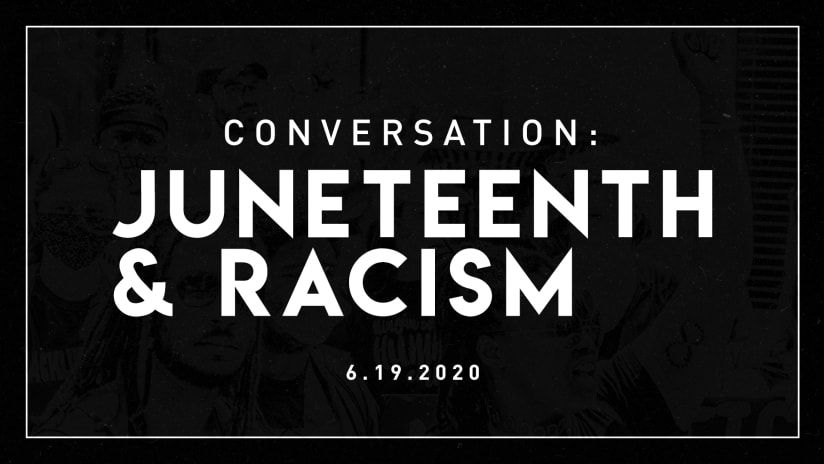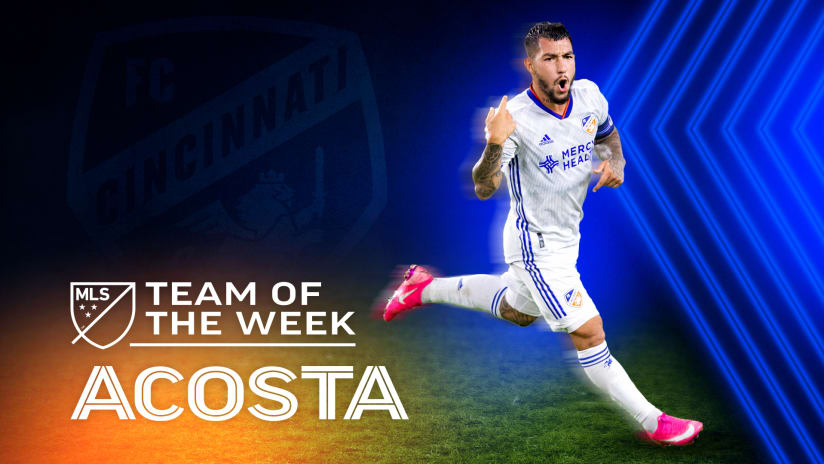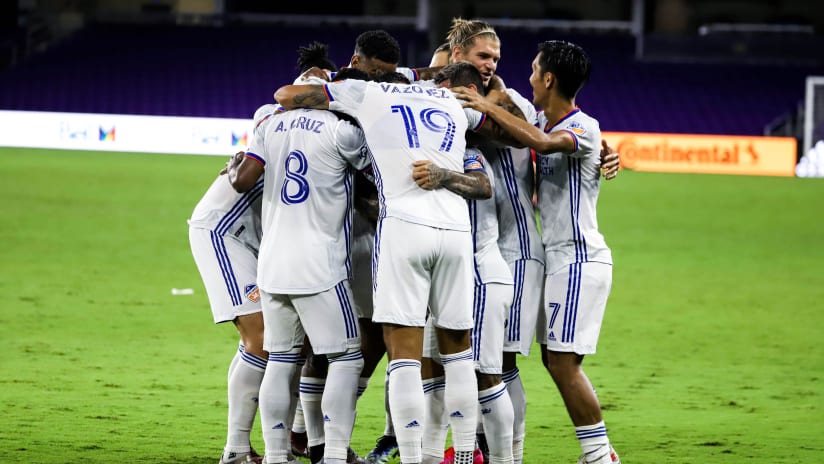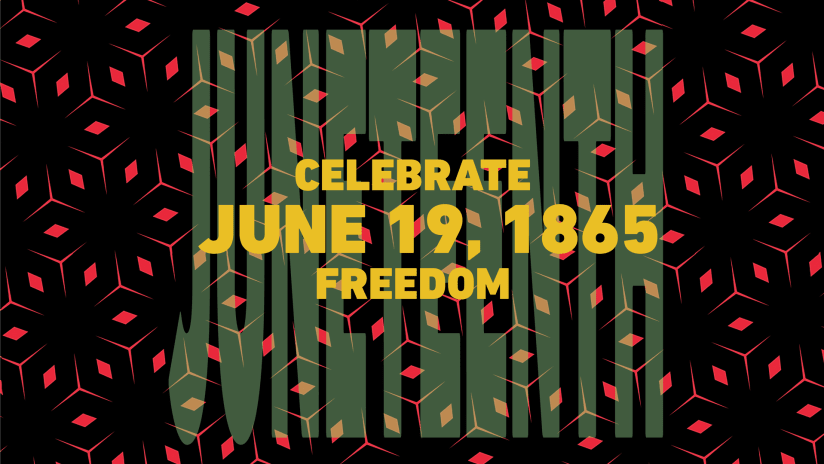Writer’s note: Like many of you, I’ve watched the Black Lives Matter movement use its collective voice to shed awareness on the systemic issues perpetuating racism and inequality in America. The recent senseless murders are just that: recent. Racism isn’t a new problem. It’s here. It’s an issue. It’s unjust and it’s unacceptable.
With increased conversations happening right now, I wanted to have my own conversation about Juneteenth and racism with some of our players. They’ve always been amazing to talk to about anything and everything, and I hoped they’d be open to this sort of discussion. I hoped they’d be willing to use their profiles to talk openly about their experiences, their opinions and their hopes. I wasn’t surprised when all six players we asked to participate did so with zero hesitation.
The full conversation below has been pulled together from three separate conversations that occurred earlier this week. I want to especially thank Saad Abdul-Salaam, Fatai Alashe, Zico Bailey, Joseph-Claude Gyau, Kekuta Manneh and Kendall Waston for taking the time to sit down, open their hearts and talk honestly and openly with me.
While I was the fortunate individual to hear our players’ views and opinions first-hand – and learn new things from them – I hope our fans and the MLS community can take the time to read this entire discussion and realize we all have the power to compel change.
The entire FC Cincinnati family is committed to being a part of the solution. Are you?
How and when did you first learn about Juneteenth?
Joseph-Claude Gyau: I first learned about Juneteenth a while ago, but it wasn't in school. It was something that my mom taught me. My great grandma, she went out to work as a secretary in a job. And when she signed up, they didn’t tell her they were going to make her a maid. She was kind of swindled into this job. I wouldn’t want to take it as far as an indentured servant, but that’s kind of what the situation turned out to be. My grandma, she grew up in her early years in Jim Crow (laws) because she’s from Richmond, Virginia, so she was growing up in segregation. So my mom’s side is where I learned about Juneteenth. I didn't really get the full spectrum of it in school, though. Most of the stuff that I learned historically about Black people came from my family.
Kekuta Manneh: I first learned it in my history class, when I first moved to the States. History was my favorite subject, so in the U.S. history we learned, I brushed up on it in my class. I think it was grade eight. I think that was the first time I've heard the word and get to learn about it.
Saad Abdul-Salaam: For me, my parents were from the South, North and South Carolina, and I have family that lives in Texas. That was just one of the things that was talked about growing up, so I’ve known for a little bit.
Fatai Alashe: I first learned about it in high school, maybe like early college, but didn't know too much about it. Obviously, when I found out what it was, I looked more into it.
Zico Bailey: I first heard about it like a year ago. It was around the time Nipsey Hussle died. I heard about it through him and more research. In school I never learned about it. Growing up I never got that foundation about what it should mean to me, someone else telling me about it and then educating me on it. Now I’ve barely learned about it and I have to learn myself what it should mean. I’m still trying to get more information to know how I should feel about it. I think that’s a problem, too. In school, they don’t really teach out about Black history and some of what we were before slaves. In school, they just teach you Black people were slaves back then and then on this day, they got their freedom. And that’s it. They don’t really tell you anything else.
Fatai Alashe: I think what Zico said is really true. I went to a predominantly white high school and, I don't know about the curriculum at other schools, the only one I can speak of is mine, we didn't learn much at all about Black history. In February, there's Black History Month and you dive a little deeper into it then. But it's mostly just you talk about slavery, you talk about Martin Luther King, Jr. and that's the end of it. It's important to do more and I think as a society as a whole we have to do better. Part of it is educating young Americans on these types of issues and just having conversations at a young age and making it easier for all of us.
What does Juneteenth mean to you personally?
Saad Abdul-Salaam: Personally, I just feel it’s very powerful knowing with everything that Black people have gone through around the world, and especially in the United States, we’re persistent. June 19 definitely helps you remember that persistence is key and it's a push forward in the right direction. Each year comes around and it reminds better times are coming and, obviously, that happened and you have to keep pushing and stay persistent.
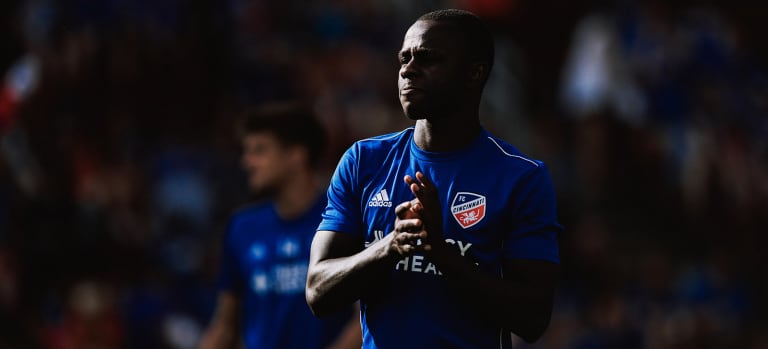
Kekuta Manneh: It’s resilience from a group of people that they are not satisfied with the conditions they were in. They had to fight and scrap in order to make the changes and sacrifice their lives to make the changes for us to be in to be able to live freely in the world, no matter where we are. It also puts a notion in people’s heads that everybody’s equal or the same, and we should all be treated fairly. People fought for that. I feel very proud knowing that there were slaves taken from my country. Everybody knows Roots and Kunta Kinte, so I feel really, really proud when it came around, June 19. As Saad said, good things are ahead and better things will come. It lifts your spirit up. We’ve risen from the ashes and make things happen for the future generation to be able to live a better life. Your people did that, you know?
Joseph-Claude Gyau: It’s going to be different for everybody. For me, half of my family is obviously American, so that’s a strong point of the heritage. It represents the resilience and all the hundreds of years of slavery that my ancestors had to go through. The countless centuries of unpaid labor. The beatings, the hangings, the lynchings and just the fight that they were able to endure – and still endure to this day – for me to be able to come out here and play soccer and do the things I’m able to do. It’s just a symbolism of strength to make it to that point where they were able to see their freedom. Obviously, they weren’t completely free after that, but the idea of involuntary slavery was over. It’s a huge point in history and I think it should be put on a bigger stage. If people know the history a little bit better, then we can prevent certain things like what's happening nowadays from reoccurring.
Fatai Alashe: For me, especially today, I think of it as a sign of the possibility of progress. That was a big progression for Black people back then, I think that should give us hope that more progress is possible. Especially today, that's something that we need and something where we're kind of at a point where we're trying to take a stand for it and, and accept nothing but progress.
Do you believe it should be a national federal holiday?
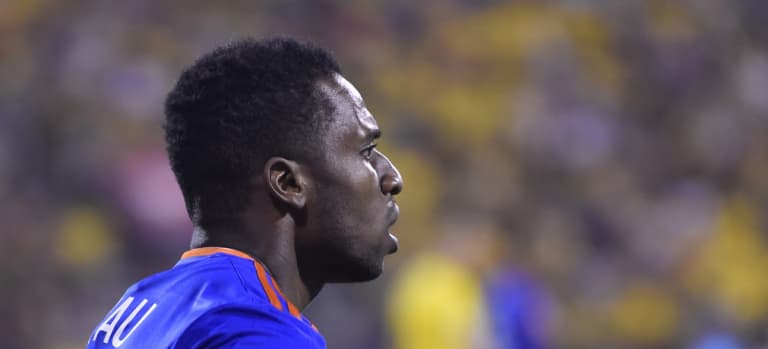
Joseph-Claude Gyau: It's not just a part of Black history. Black history is American history. I was always a strong advocate for that. It’s cool to have a Black History Month, but Black history is American history. Black people were fighting in the Civil War. Slavery, all the things that were built in the South and all over America. So many inventions came through Black inventors. So, American history and Black history should all be one. So, I definitely think Juneteenth should be a national holiday.
How did discussions about racism happen in your family? Did they make you aware of differences early on in life or was it after something discussed after your parents realized you understood something that may have happened?
Joseph-Claude Gyau: It just came about just because at a certain age, when I was capable of noticing differences, that's when my parents brought it up to me. I think I was still in grade school and my parents had me watch the movie Roots by Alex Haley, and that was the introduction for everything to me. After I watched Roots, I got the history part down pat about cause my mom. She's American, and my dad's from Ghana. So, her family, they were slaves. My dad's family, they were just in Africa and then he came over with his dad. That's kind of like where I got the rundown. At a young age, they introduced it to me, and then life experiences gave me all the info.
Saad Abdul-Salaam: For me it was never something that was discussed. It was something that was shown. You see it and you don’t really think that it’s really like that until you have your own personal experience. Whether that’s going to the store and you get followed, or hanging out with certain groups of friends that’s more diverse or less diverse, and you see how the police might stop and look at you or follow you. I think it gets discussed when it necessarily happens to you more or less, than like they give you a preemptive strike.
Fatai Alashe: I think my parents did a good job of teaching me and my brother from a young age – which again is a shame – but they had to teach us certain stuff that you just can’t do. There were a lot of things that friends were doing or even teammates at a young age were doing, and my parents just weren’t having it. “I don’t care what you see other kids doing, you’re not allowed to do that because you will get in trouble for it. They might not get in trouble for it, but you will so you can't do it.” There were times when you would get in trouble for things that everyone was doing and you’re confused. You go home and tell your parents, “He was doing it and he was doing it,” and they were like, “How many times have we told you that you can’t do the same stuff that everyone else does?” Those are experiences that you learn from when you're young. Which, again, I keep saying it's sad, but it's instilled in you and you just know better as you get older. That's just how you live your life, walking a tightrope because you know that your actions may lead to repercussions that wouldn't for other people. It's just the way you live.
Zico Bailey: My mom was home most of the time because my dad was always working. She did a lot of protecting us. He didn't want us to do a lot of stuff, and I think, even for her, she didn’t have a lot of education on things that Black people go through because she’s Asian. She has her own (experience) as an Asian American. I remember when we were younger, me and my brothers, we always wanted to get braids and dreads. She kind of had that perception that other people are going to look at it as different. Like, “Their hairstyle’s too black. You don't want to look like thugs” and stuff like that. I think even she needed a little bit of education on the stuff that white people go through. But I think now that we've all grown up and it's more in the media, she is learning and then we're also learning as well. In fifth grade, that’s when I started to have those conversations with my mom mostly.
Kendall, when you were growing up in Costa Rica, was racism and inequality a problem like it is here in the U.S.?
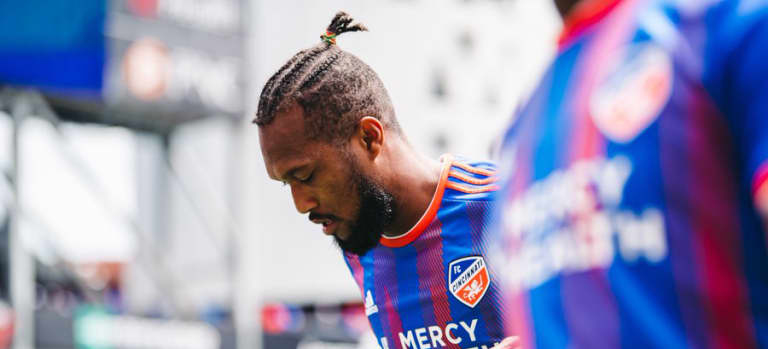
Kendall Waston: Not at the same level. Here is much bigger. Why? Because, for example, when I was growing up, my hometown is where the majority of Black people are in Costa Rica. Why? Because many years ago, they brought slaves and Black people to build the train tracks. The deal was, if they build it, then they can stay and live there. During those years the Black people weren’t allowed to go to the capital. Those was like the stories that my grandfather told me and they have to sit at the back of the bus and those things.
Kekuta, being born in Gambia before moving to the U.S. and ultimately becoming an American citizen, what was your experience with racism growing up?
Kekuta Manneh: Coming from Africa, I was a bit naïve. It's different, more difficult for these guys because they lived it day in, day out and they grew up with a culture that's what they know. It’s so engrained in their culture. For us, it was a bit different coming from Africa or Costa Rica. You know, everybody looks like you, or most people, predominantly. The notion is not there.
Where I came from, it was very American and British culture because we were colonized by the British. So everything we did was either from America or we want to copy the style. Our football is the Premier League. Then movies and music were all an American side. So, the culture was mixed with our culture, as well. People were aware of what was going on in America, even though you probably don't see it in the news or you wouldn't see it anywhere else. But in the movies and the rap and the music, you can definitely see it. That's the first time we kind of get exposed to that. People were talking amongst ourselves and you know, you consider it a racist country in how Black people have been treated in America.
Kendall and Kekuta, what have been your experience with racism now that you’re in the United States?
Kendall Waston: In Vancouver, I didn't have any experience. But when I came here (to Cincinnati), I see more of as an impact, and first, with my wife. It is strange because when I walk one time in downtown, there was another Black woman looking at me and my wife like, “What am I doing with her because she's white?” And one time after I got pulled over, the police man he came here with a flashlight looking, like, “Do you have any guns? Do you have any drugs or whatever?” I say no. In my mind, I remember, oh, this is what happens in movies. People stay with their hands still, so I did. He stayed looking at me and was like, “What are you doing?” I said, ‘I came from playing.” “With who do you play, the college or something?” I say, “I play for FC Cincinnati, the professional team,” and he sees the crest. As soon as he sees that and I tell him that, you can see his face and everything and how he speaks changed. The way I feel here didn’t happen in Vancouver and didn’t happen in Costa Rica either.
Kekuta Manneh: When I moved to the States, it was a little bit different for me. You have that notion in your head that people say this is a racist country. A lot of people – my grandparents, my friends – before when I got a visa to come, they were like, “Hey, you have to be careful you have to do this in this day and that on that day.” When I came it was right around when Amadou Diallo got killed and Akon sang about it, as well. Everybody knows that song because the guy is from Senegal, right next to Gambia. My grandma and my uncle, everybody talks about, “You have to be careful. Go to training, go to school, come home.” That resonated with me and I was very, very careful. But I was living in a predominantly white environment. My parents – my other parents – were white, my siblings, too. I didn’t really see the firsthand experience of racism because I was protected by my white family that I was living with at the time. So, I think I probably didn’t experience it as much as African Americans that were born here, that work here. But there were some instances that happened for sure.
Kendall Waston: There are so many things that we are ignorant of not living in America. Because your reality is totally different (in another country). The way you with live racism is different because the people that can be racist, they are more exposed, and you attack them. For example, in Costa Rica, we don’t have any army. We only have police, and the police there is not like here. Like in America, with police you cannot joke. In Costa Rica, we don’t disrespect them, but they don’t have the same authority as the ones here. Over there you can try to get to them and confront them. But all of this type of situation (here in the U.S.)? We don’t live with this intensity (in Costa Rica).
What was the first time you remember in your head that someone's actions or someone's words were not right and it was really racism?
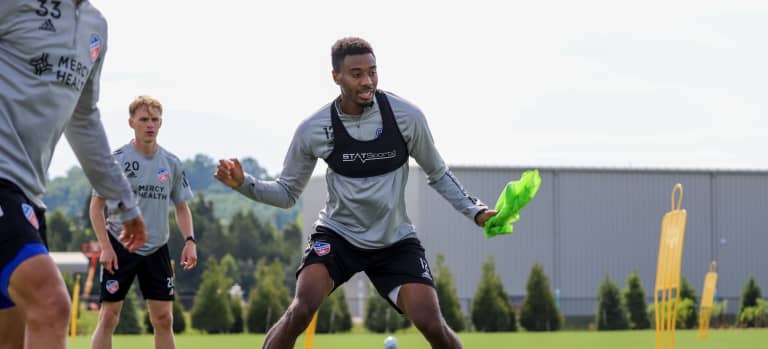
Saad Abdul-Salaam: I think my first realization of it was probably in middle school and we took a field trip to HBCs down in Atlanta. And remember, we stopped at a CVS or Walgreens, and this is back when there weren’t iPod shuffles or anything like that. It was Walkmans. I remember my white classmates were behind the (counter) area, but that’s where the Walkmans were, and they were looking at them then walked away. Then me and two other Black students walked over there doing the same thing, just looking at them. The manager was there the entire time, but then the manager decided to come over and approach us just because, I guess. He was like, ‘What are you guys doing?’ We’re like, ‘Oh, I’m thinking about paying for this,’ and he was like, ‘You don’t have money to pay for this. You’re just in here.’ We’re like, ‘I literally have my money right now,’ and he said, ‘I think it’s probably best for you guys to just leave the store.’ That was the first time I was probably like, ‘So my money isn’t the same as everybody else’s?’ My mom got to go on the trip and I remember going to her and asking what was going on. Why can’t I buy a Walkman? It’s a very tough thing for any parent to tell their kids this is a real thing and this could happen to you, and it’s just how you handle it. As bad as it is, most of the time, just stay cool and have a calm head because obviously things can get a lot worse if you were to lash out. It’s a very conflicted emotion to have inside. I want to speak out about this, but then at the same time, it’s a manager’s word against a middle-schooler’s word, so you’re in a tough situation.
Joseph-Claude Gyau: One of the first times I remember was just playing youth soccer and our team had a lot of guys like myself, first-generation immigrants that come over and have kids here. We were beating up on teams, and I just remember the parents saying, “Your team is full overaged Africans who probably have kids in Africa.” At the time we were like, what? We were 10, 11 and 30 and 40-year-old adults are telling us to our faces after a game. What did we do wrong? All we did out here was just play and happened to beat your team. It’s one of those things where it’s extreme confusion. I didn’t know how to take it at the time. But after a while, it sits in your head, and when you get older you realize the animosity that’s behind these statements, and it makes you angry. And that was just some of the first instances.
Kekuta Manneh: When I started going to school, it was a friend and one of the first two weeks of school. I think they had never been exposed to an African, maybe? We were talking and they were asking me questions. It was very innocent. So then one guy was like, ‘I heard you people live on trees.’ He was a friend and maybe he was trying to be funny. I was like, ‘Yeah, my grandma lives on the top branch.’ We were having a conversation. He was asking me weird questions, like, ‘How did you get here? By boat?’ Sitting here now or thinking about it in past years, this guy was ignorant or he was being racist, but he was my friend. I still don’t know if he was being or not. The last thing he said was, ‘The KKKs were coming.’ And then he’s like, ‘No, I’m playing.’ I had no idea what KKKs were. And then I went home and told my mom, ‘What is KKK?’ She was like, ‘Where did you hear that word?’ I said one of the kids in school told me the KKK were coming. My mom flipped. She was a white lady but she was like, ‘Who told you that? Can you recognize the kid? I’m going to go to the school.’ I didn’t want to get him in trouble. I just got to the school and I’m making friends. I just said it was a group of us and he said it in conversation. Looking back at that now, I would have probably had different reaction to the kid than I did before. I laughed about it because I had no idea what that was.
Kendall Waston: I was growing up at the age of 15, 16, when I went to live in the capital. I was walking into the street and I see ladies walking toward me. As soon as they see me, they cross the street. It wasn’t any insult, but just that feeling of, “Oh, they see me this way. They feel a threat or something.” It also was like in a way that I was thinking, “Do I have to change something of me to don't make the others feel like strange?” Getting to understand those things and asking my parents, “Why is this happening?’ What am I doing wrong?” Those were the first experiences that I had.
Zico Bailey: The first time I knew I was different from other kids, I was in fifth grade and I used to have a big afro. The kids would always want to touch it and make little comments and stuff. I remember one kid saying, “Oh, do you go into the forest and burn your hair or something? Why does it look like that?” I don’t even know what he’s saying. I just told my mom and she was like, “Why would he say that? It makes no sense.” I didn't know if that was racist and not. I was a young kid. When I was in fifth grade, a lot of kids would point stuff out about me. I thought I was the same as everyone. You’re so young, so you just look at everyone the same. Fifth grade was the first time that people pointed stuff about me.
Fatai Alashe: I would say I'd have pretty similar experiences as Zico. It's always kind of sad but funny, like the hair thing. I think that’s probably, for a lot of people, one of the first times you’re like, “Yo, what the hell is going on?” People say like, “Oh, your hair feels like a sponge. What do you do to your hair?” It’s just my hair! I didn’t do anything. I woke up this morning, showed up to school and my hair is my hair!
Do you think this year's Juneteenth holds more significance now because of the incredible attention racism and the systemic issues propping up racism have received in the last four to six weeks?
Fatai Alashe: Absolutely. Like I was saying before, I don’t think I’ve heard this much about Juneteenth ever in any other year that I’ve lived. I think that's something that can be looked at as a good thing. Obviously, it comes from an underlying issue but I think it's something that we’ll hopefully start at least a conversation about, maybe changing the way that we learn about history in some ways. Just letting there be more opportunity for people to learn more about these things that have obviously taken place.
Joseph-Claude Gyau: For sure. Just everything circulating around it, there are a lot of things that are coming to the light that people didn't really know about. I just think having Juneteenth coming up, it's really symbolic for everything that's going on. I feel the reason why this movement has been able to catch so many people's eyes is because now people are paying attention. People are informing themselves. People see that what’s going on isn’t right and what’s been going on isn’t right. I feel like a lot of people are accepting history now. All of that does elevate the meaning behind Juneteenth.
Kekuta Manneh: I think the celebration will be a lot more because of everything that’s going on. I’ve never celebrated it. Living with a white family or in a white environment, it was different, almost non-existent because it didn’t really affect their environment, which is OK. This is probably the first time I’m going to celebrate it because I’ve made some friends here down in Cincinnati who actually invited me for a meal, a sit down and talk over coffee. I’m really looking forward to it and seeing what it’s all about. I’ve heard it from distance, I’ve seen social media stuff from distance and it will be nice to actually be a part of it this time. I think it will be the best one that ever happened in a while. I would love to be part of that.
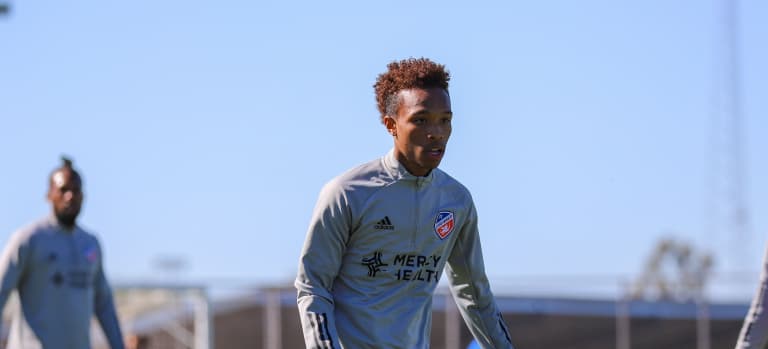
Zico Bailey: There’s a quote from Will Smith that says, “Racism hasn’t changed, it’s just now being recorded.” It’s gone on for years and years. It’s just now we’re seeing it through social media and on video, so it’s being pushed in our faces and then people are forced to talk about these topics. But I think that’s good. This is the first year that Juneteenth is actually being promoted in the media, so I think education is the most important thing in knowing history.
Saad Abdul-Salaam: At this point, I guess this one is like special because you want to see that next step or the next like leap into actual change. This one is more special because we do have a little bit more awareness and this is the time to make a push for a better future, like for whenever your son grows up or we have kids. That's the hope that you just want to breathe and share more love in the world. No one’s born with hate. It’s a proven thing. You have to learn it somewhere along the way to not like someone based off the color of their skin.
Kekuta Manneh: You see a lot of different people: Black people from different backgrounds, Hispanic people, white people, Arabic people. Everybody is in one way with unity, and everybody’s looking for one common thing. I think that will spark it and make it big this time.
Fatai Alashe: I think it's definitely highlighted a bit more in today's day and age just because of all the things that are going on, which I think is important. I think it's good for especially younger kids, hopefully, they'll learn more about this kind of stuff and have opportunities to explore more of that historical background.
The recent attention from the George Floyd, Breonna Taylor and Ahmaud Arbery murders has brought the topics of racism and inequality top of mind for a lot of people. But this isn’t the first time we’ve heard people outspoken about inequalities.
Saad Abdul-Salaam: People listen to rap music all the time and think it’s more for the people who are in the ghetto or are in a harder, tougher situation. When really, anyone who’s experienced racism can relate to that music. It doesn’t matter if you’re in the suburbs or a nicer area. I can work the same amount and have a nice car, but I’m more likely to get pulled over because they just don't expect that because it's just what the media portray. It’s like one side of rap music is just trying to tell you what’s going on.
Kekuta Manneh: When I moved to the States, obviously, we were aware of it growing up in Gambia from watching the movies and some of the storylines about racism and listening to hip hop music. The rappers are crying about what’s going on in the country, what happened to someone that got killed and stuff like that. They were talking about it, they doing kind of protests in their own, speaking to the truth about it or, you know, raising awareness.
With all the people listening and learning about the Black experience in America, what do you want folks to take away from this time of enlightenment, education and advocacy?
Saad Abdul-Salaam: I just want everybody to not let this be a trend. The world we live in now is a lot of trends. It’s more like, if it didn’t happen to you, then it doesn’t really matter. That's the thing I want people to take away. I mean, even me like as an athlete, there's an athlete privilege. I’d be lying to you if I said I didn’t get treated differently, specially, by police. And that’s why me, personally, that’s why I respect the Colin Kaepernicks of the world. He used his platform. This has always been a problem, way before where we are today. He put the social injustice platform ahead of himself. If I want anyone to take (something) away from this, if you see some injustice, you should say something. It shouldn't be something you should deal with and something for the next generation to deal with. If you can change it, change it now.
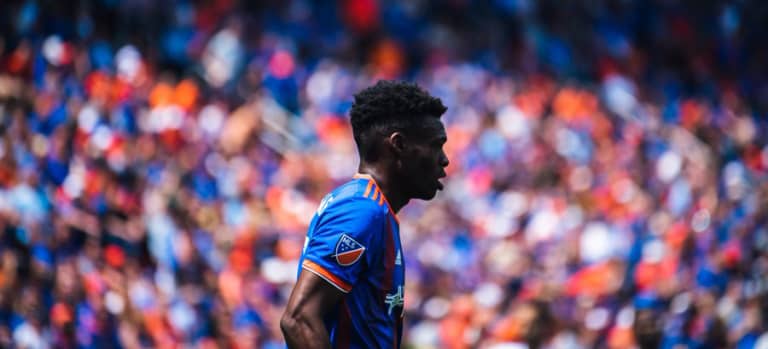
Fatai Alashe: A big thing is a lot of people focus on police brutality. I believe that it's a much bigger issue. Unfortunately, it happened to get caught on camera, which a lot of things are nowadays. But that's just one small action that happened to get caught on camera. There's a few other things that you're seeing now in social media that are also getting caught on camera that are coming up either now, or from years past, that are being brought to light. But, those again are very serious instances, but this is stuff that happens every day. It's stuff that you experience all the time, unfortunately. But that's the reality of it. And I think that all of us need to understand that this is a bigger issue. It's an issue that dives a lot deeper than just police brutality. And I think that's something that we all have to be aware of it and make sure we focus on as well.
Kekuta Manneh: For me, the keyword is now. People NOW realizing that. I think it’s really, really sad that it had to take this long for people to want to be educated or willing to listen or finally realizing what’s going on. It’s never too late, but the decades and decades people went through, the injustice and slavery and the inequalities. And it finally takes a lot of people to lose their lives again for people to actually stand up (and say), “This is wrong, we’re going to stand with you.” I think it’s really, really sad.
Saad Abdul-Salaam: Like Kekuta said, it’s sad that it took people maybe being in quarantine and just seeing a man die in front of your eyes because you’re living in 2020. It’s not like this hasn’t been seen. Movies are based off real events, and it’s almost like people are like, “Oh, that’s sad that that’s happened.” But now that you can literally pull your phone out and see a video and watch a man unfortunately die in front of your face. It hits home because it brings out a realization of like ‘this is really happening,’ as I hear more and more stories all the time.
Kendall Waston: One of the main things that comes to my mind, and I was talking to my wife, is that the main fight is just to make people accept us or make us equal. We are not thinking to be more than the other or whatever. That opens up our minds and our brains so, so much because for us it’s normal to see each other. But it’s not normal for a certain amount of people to see you and treat you different. For us, it’s like shocking. Why do they think that way or why do they react a certain way? I heard a story of a boy and he was talking about how it’s hard for him to walk in the night going to work, and sometimes going to the grocery store. But sometimes he has to take his son with him so other people don’t feel threatened. For me, I was like, “Wow, you have to change your own self to make others be cool (about you).”
Fatai Alashe: I think the biggest thing is to do the best that you can to have the best understanding that’s possible for you. Everyone's level of understanding is going to be different based on your experiences. Obviously, a lot of people aren't going to be able to understand it the way we do just because they haven't lived in our shoes, which is normal. But I think the best way you can understand what other people are going through is the easiest way to take action. Not so much sympathize, but just to get where they're coming from and where they are. Once you understand – and once you're willing to have an open mind to things and see things differently – I think it makes it easier to have what would be difficult conversations with other people around you. There's been a lot of instances where, you know, maybe we've all seen or experienced something that was maybe not they're not necessarily right. I think a lot of times we shy away from saying something and calling it out, and I think that that's something that has to change. We just have to be real with ourselves and those around us, our loved ones, and have conversations and just not be accepting of the standard that we’ve been setting so long. I think having genuine feelings and taking real action is important.
I see a lot of tweets and Instagram posts and all of this stuff that is great and in a time like this is important to bring awareness. But I think also it can't just be a tweet that is put out or retweet or repost on Instagram. It has to be real action that you're taking in your life to facilitate change. Whether that be having a conversation with someone you know about these issues, or just bounce ideas off each other and bounce feelings off each other to develop better understanding. That's something anyone can do.
So, I think a lot of it is taking the overall awareness aspect of it and turning it into something more tangible.
Zico Bailey: With retweeting and posting stuff, it's good because that's how we all have our voices now and then every tweet can have 1,000 people see it. So, that's a little bit how you have your voice. But I think that's the bare minimum that some people could do. Just have an open mind and think if you were in their shoes, how would you feel?
Joseph-Claude Gyau: I just want them to know that it's not something that's going to change overnight. The system has been set in place since the beginning of America, basically. I don’t think it should be a fad, and once sports come back, it’s like, “Oh, let’s forget about it.” It’s something that a lot of time should be dedicated towards, and in doing so by informing yourself. I feel like I’ve seen a lot of people get offended. Like, “Why is Black Lives Matter excluding everybody?” It’s not excluding anyone. It’s just bringing awareness to what’s been going on to this group of people for so long. Obviously, we want justice for everyone. But these issues, especially since the George Floyd killing ... I think I read somewhere there’s been more than 120 more cop killings, and that’s not just Black people. That’s all races that are getting hurt by police brutality. Just these small steps that people are taking by informing themselves can make a world of a difference for the future. Just knowing that these small little reform bills being passed, donating to non-profit organizations, helping impoverished and disenfranchised youth across America, those things will help close the gap tremendously. Keep your foot on the pedal.
Have you looked to educate yourself any more or any differently?
Kendall Waston: For me, it opened my eyes to educate myself more and read my rights here in America. For example, what I can tell our officer in certain places? What are my rights here and there? I have to educate myself because I’m living here. I have to know what are my rights. Yes, this opens my eyes because I also have to teach my son and I have to teach my wife. The more we acknowledge things is better.
When you hear that other people just realizing there are so many things they take for granted that you and your family have been living with your whole lives, what’s your reaction?
Zico Bailey: Finally we can have a conversation about it! They’re asking because they want to know. They’re not just asking because all social media told them to do it, or just out of the blue. They genuinely asked me because they want to know and they want to be part of the solution.
Fatai Alashe: It’s definitely a bit frustrating because to me it just seems impossible (they didn’t know). I’ve heard so many times, “Oh, there’s no racism” and stuff like that. Every time I hear someone say that, I'm just like, “There's so much stuff just staring you in the face!” It's not that it's not there, it's just about whether or not you're willing to see it and accept the fact that it's there right in front of you. So, from that standpoint, it's a bit frustrating. As far as people actually trying to understand and do more, I don't think there's any frustration in that. That's a really important thing, especially people that you consider your peers, your friends. It's good to have those conversations with all those people. Maybe those are people you've grown up with, maybe there's things that you've dealt with that they didn't see, or they didn't notice, or they didn't understand at the time. Now’s just the time that they're feeling more open about asking those questions or diving into those topics. So, I think it's important to have those conversations.
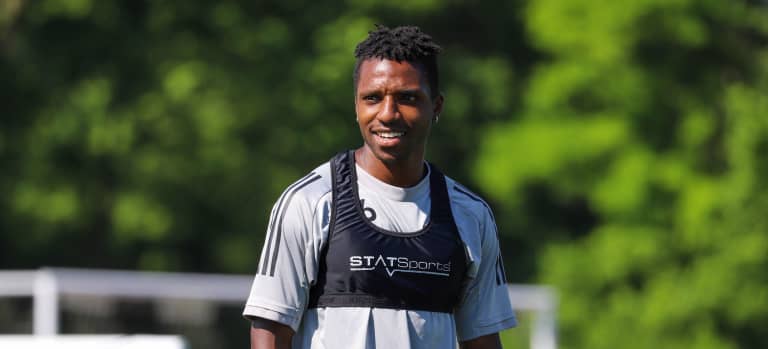
Joseph-Claude Gyau: My initial reaction was, “It’s about time!” But then after I talked to my wife about it, she was like, “Yeah, people don’t know what it’s like, so it’s better they start now than never.” As much as everybody is fully aware, some people will never fully understand, you know?
There're instances where me or my dad or my friends will have note cards in the car for when we get pulled over, so we don't have to make any sudden movements or reach for anything. “Okay, my ID is here, like, let me get it.” I've had friends where you make sudden movements in the car, and a cop will automatically (pull his weapon). There're been instances where I've been in before I was playing soccer, in my neighborhood and we were playing basketball. The cops will just pull up and say that they're looking for somebody because something happened and we're little kids playing basketball. And we’ve just got to sit there on the curb, with our hands behind our back and wait for an hour until they figure out that it wasn't us.
I remember my dad was driving up to Frostburg, Maryland, and he taped his driver's license to the steering wheel so he wouldn't have to go in his pocket and get it. Things like that, you're always thinking of ways to where you don't have to raise any fear. It’s wild. But I'm just glad people are able to see a little bit now. Just a tiny glimpse of what has been going on for a while.
I'm guessing that the frequency in which you've had conversations and probably outside your closer family or friends circle has increased dramatically in the last month. How are you handling that?
Joseph-Claude Gyau: Definitely I'm having more conversations about this with people that I normally wouldn't talk through it with. I think it's good for the people who actually do want to have the conversation. It’s great. I do feel like there have been so many other things that have happened leading to this point to where sometimes I'm like, “Oh, man, how are we just seeing this now?” But we're here now and I'm glad everybody is able to see things through a common lens, and I hope these talks keep progressing. Sometimes it does get tiring a bit just because I know a lot of people are new to it, but certain things, these things are like an everyday thing. As weird or sad as it may seem, I don't even look at it sad anymore because it's so normal. It's an everyday thing, but I'm glad people are stepping out because we need everybody to step up for change to happen. I have no problem with it.
Fatai Alashe: I’m very open to having conversations. That’s not a problem for me. As long as the conversations are genuine, and as long as there's a real desire to learn or to understand or to change, then I'm all for it. Where it becomes more in between is when it’s not genuine and it’s more, almost like a protection or feeling forced. I know the thing that was circulating on social media, “If you're silent, you're part of the problem.” I think a lot of people took that with the wrong meaning, basically saying, like, if I don't tweet this, if I don't post this on Instagram, I'm a problem. And they maybe do that stuff to (get validation). That's not necessary. That’s not what anyone is asking. A lot of people may see it, but at the end of the day, that’s one social media post and it’s actually not going to change anything. I'm more open to the conversations that are real and meaningful and actually come from a desire to change and do better and to learn and to understand. I don't think it's something that people should be afraid of. Like I said, there's different levels of understanding. Certain people are never going to understand it the way me and Zico do. Zico and I won't even understand it the same way ... we have different experiences. There's no reason to feel uncomfortable about having a conversation where maybe you're not really sure about things or you don't know how you feel about certain subjects. There should be no fear of not knowing enough or not understanding enough because you can always learn more and have a better understanding. Talking and conversing with people, looking stuff up on the internet if you have to – that’s the only way to learn. But if you’re afraid to, then you never will. This is just the first stop in getting there.
Zico Bailey: The uncomfortable conversations, now is the perfect time to have them. A lot of my friends aren't Black and we've been having a lot of conversations. They asked me stuff and then I asked for their opinion on it. That's how I'm trying to do it. You have to have those conversations at home with your friends, with your family, people like that. I think it starts from there. Where you can relate to it the most is when someone that you know who goes through it, and then you hear their experiences or they hear my experiences of it. He could have a completely different experience from me because for me, I think my parents, they protected me from that stuff. They tried to sweep it under the rug a little bit because they came from different countries and they didn’t want their kids to see the bad stuff. They’d just sweep it under the rug. The uncomfortable conversations have to be conversed.
Do you feel, as a professional athlete, you should use your public and high-profile position to speak up and help lead the conversation?
Joseph-Claude Gyau: I feel like it's my responsibility because I know there's hundreds of millions of kids just like me that go through the same thing. You’ve got to let them know that it's not only something that's excluded for professional athletes. To use my platform to also inform other people who aren't African American that, yeah, this stuff can happen to anybody. I definitely think it's good to be able to use your platform. People often say, “Oh, you're not an advocate or you're not a revolutionary. Just stick to soccer.” But I'm not going way off a limb. I’m speaking on real experiences that are my life. I'm speaking on things that are happening right before our eyes. And I definitely feel like it's my responsibility to inform people and also inform people who look like me the things to do to stay out of trouble, advice to help kids not get into certain situations. It’s a number of things. Maybe that's just me, but I definitely do take a large bit of the responsibility on my shoulders just because I was one of those kids that was, when the cops came, turn my back. I'm not trying to raise any eyebrows. I'm not trying to ruffle any feathers. I was one of those kids where you go into an environment and you got to keep your mouth shut when things happen because you're probably the only Black guy there, and if you speak up, you can lose your job. I know how that it feels. So, to be in this position to be able to inform other people and give advice, I'd be doing a disservice if I kept my mouth shut.
Saad Abdul-Salaam: I embrace it. I’m from Cleveland, so it’s something for me to say I look up to LeBron (James) and how much he’s done. You have to think that not many athletes before LeBron, or not many that I know of, used his platform to really (promote) anything. You hear it all the time. We're an athlete, we start talking about politics or something like that and you hear, “Shut up. We’re here because we just look at you as an athlete.” And that's why more than an athlete thing hits home because, like, I'm a person just like you! You come to the games on the weekend, you cheer for me then. But then, you don’t have my back at the same time when I go home? We don’t all go home to the same type of lifestyle. It’s definitely something where I want to share with everyone and give everyone more knowledge. I want a world where everyone is equal and everyone has an equal opportunity for love.
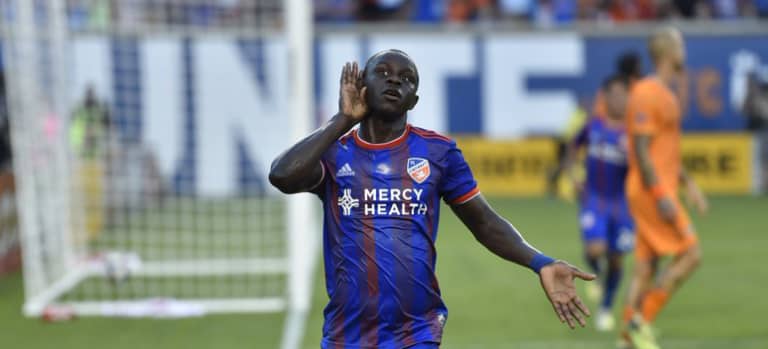
Kekuta Manneh: They say knowledge is power. The more knowledgeable you are, the easier things come for you. Just knowing your environments and staying on the safer side for me. Just be educated about your rights and what you need to do when you face certain situations. I don’t think it’s an added pressure, honestly. I think it’s our responsibility as where we are right now and using our privilege. Using are status in our community or the world, we can reach a lot of people. He’s got a bunch of followers on Instagram, I’ve got Twitter, he’s got Snapchat. We have to use our platform to spread the message. (We need to) educate people. People want to listen to us, and now’s not the time to shy away from that. I’m not very big on social media to my opinions, and I might post a silly picture here and there, but I’ve seen a lot of people speaking out who never post anything, but this touched them. Whether they’re white or Black people, we shouldn’t be an exception. If we don’t do it, we probably are part of the problem. A kid in the street might be willing to listen to me more than someone he doesn’t know. He might be looking up to me and everything I say, he thinks is right. I think we have an advantage over a lot of people, so we have to use our platform to be able to spread the message in the right way and educate people. It’s not a burden at all. It shouldn’t be.
Fatai Alashe: Right now, I don’t think there’s any question that social media is being used to bring awareness to the topic. But I don’t think a post from every Black player is going to change the fact that people are seeing these posts already. As individuals in our position, I think it's more important that we do bigger things than just a post on social media. I don't think that's always necessary. I think it’s more important we help our local communities and we help Black charity organizations, young Black kids that are in need in our area. I think it’s more important that we do what we can do help organizations like that to grow and do better for them. The awareness part of it is the first stage and that stage has been handled pretty well. Now, it's about taking the next steps going forward.
Zico Bailey: It’s kind of tough. Even big players like LeBron, he has a big influence, and then some people are like, “He’s just a basketball player. Shut up and dribble.” On your social media, for me, I feel like you have to be yourself. On my social media, I’m going to say what I want. If some people don’t really like it, then that’s their problem. But it’s my social media. Like (Fatai) said, you’ve got to support Black businesses, the charities and the youth because they’re the ones that are going to grow up and eventually pass it on to their kids.
What do you want for the next generation? What do you guys want your kids, your future kids, your younger family generations, to experience day in and day out?
Fatai Alashe: That’s an important question. I just hope that there doesn’t have to be so much worry for them, like my parents were always worried about me and my brother. It was constant and making sure we do the right thing so that nothing that we don’t deserve happens to us because it happens all the time. I'm not a parent yet, but I can imagine Black parents in this country, it's a struggle every day, every time your kid leaves the house. You're worrying if they're going to come back or not. I think that would be the biggest thing: Just to be able to live without that fear of something bad happening for no reason.
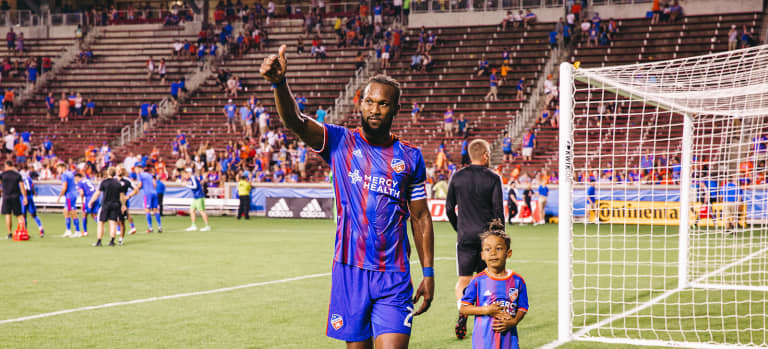
Kendall Waston: I just want for my son that he can walk and feel free and accept himself with how he is. We spoke to him asking him, “What color do you think you are?” And he’s looking at his skin and said, “I think kind of gray.” We tell him, “You know your mom is white and your dad is Black. Do you know what the main thing is?” He says, “Yes, it’s to love myself as how I am.” And we say, “Yes, that is great.” My main thing is he has to assert himself and also respect the others. For me, the main thing is about respect. I don’t care if I think, “Oh, Saad looks strange.” I can keep to myself and I have to respect him. I want (my son) to live in a world of equality, and everybody live their life how they want to live it and you live yours.
Kekuta Manneh: I want my kids to definitely live in a world where they didn't have to worry about their skin color, or they have to worry about, “Am I going to get an equal opportunity as someone who doesn’t look like me?” I don’t want him to have to think about that. Those are basic human rights. Everybody should be treated equal. Going off what Kendall said, respect is everything. We’re not all going to like someone. I might dislike someone who is white, but I still have to respect him and treat him as such as how I want to be treated or how I want my wife or kids to be treated. For me, it all comes down to that. I definitely want my kids to be able to walk down the street and not have to worry about anything. I don't want to have to worry about if they're going to come home or not going to come home because of some incident or someone doesn’t like what they look like. I want the next generation to definitely not have to go through what we’re going through, protesting about equal rights, human basic rights. Hopefully in their generation they’re able to have different problems than the privileges everybody should have.
Zico Bailey: Just having open conversations because I think I grew up extremely privileged. I never really saw a lot of racism in Las Vegas. That could just be my own ignorance and thinking that stuff. But for my kids, I want to have open conversations with them and also educate them about what happened in the past so they know their history.
Joseph-Claude Gyau: My goal for them is to just build well-rounded human beings. To know their history and know where they came from, but to be accepting of everybody else’s cultures and never feel like they’re better or less than anybody else. (I want them to be) comfortable in their own skin, being comfortable in their own space, their background, the way they speak, their characteristics. That's one of the main things that I would like to emphasize. I want to be able to create a safe space you know where they feel comfortable in their own skin, where they don't feel like they're constantly in danger. And just be happy. I don't want them to ever feel down about who they are or having to feel like they need to suppress who they are. Just filling their vessel of a life with positivity. A positivity that they can go out and be who they want to be, and succeed the way that they want to succeed. I don’t want to have them filled with fear of what the world may think of them or things that they need to bottle up so that they can succeed in one area. I want them to be able to be themselves 100%.
Saad Abdul-Salaam: I just envisioned for my kids, no matter how they turn out, to be respected and not to get any side eyes or any criticism to them walking down the street or driving a car or who they decide to hang out with. I just don’t want them to have this cloud as a sense that you can’t do the same things without being judged or looked at a certain way. I just want it to be like a sunny day, in theory, moving forward.

